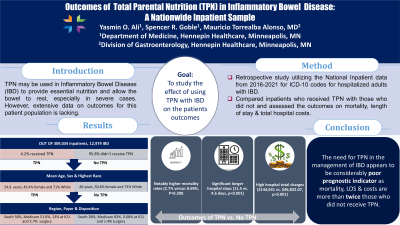Sunday Poster Session
Category: IBD
P0886 - Outcomes of Total Parental Nutrition in Inflammatory Bowel Disease: A Nationwide Inpatient Sample
Sunday, October 27, 2024
3:30 PM - 7:00 PM ET
Location: Exhibit Hall E

Has Audio

Yasmin O. Ali, MBBS
Hennepin Healthcare
Minneapolis, MN
Presenting Author(s)
Yasmin O. Ali, MBBS1, Spencer Goble, MD2
1Hennepin Healthcare, Minneapolis, MN; 2University of Minnesota, Minneapolis, MN
Introduction: Total parenteral nutrition (TPN) may be used in inflammatory bowel disease (IBD) to provide essential nutrition and allow the bowel to rest, especially in severe cases. However, extensive data on outcomes for this patient population is lacking.
Methods: Method: We performed a retrospective analysis using data from the 2016-2021 National Inpatient Sample. Patients admitted with a primary diagnoses inflammatory bowel disease were identified using ICD-10 codes. The assessed in-hospital outcomes included mortality, length of stay, and total hospital costs, comparing patients who received TPN with those who did. Multivariable regression models were used to adjust for potential confounders.
Results: Out of 309,034 hospitalized patients with IBD, 12,979 (4.2%) received TPN. Those who received TPN were older (mean age 54.6 vs. 46.0 years, p< 0.001), and 51.3% were female, with the majority being white (71%). Patients who received TPN experienced significantly longer hospital stays (11.5 vs. 4.6 days, p< 0.001) and total hospital charges ($144,631.8 vs. $46,832.07, p< 0.001). Moreover, they had notably higher mortality rates (2.7% vs. 0.69%, aOR=2.6, 95% CI: 1.6-4.2, p< 0.001) compared to their counterparts who did not receive TPN.
Discussion: Conclusion: The need for TPN in the management of IBD appears to be a considerably poor prognostic indicator in the inpatient setting as mortality, length of stay and costs are all more than twice that of patients who do not receive TPN.
Disclosures:
Yasmin O. Ali, MBBS1, Spencer Goble, MD2. P0886 - Outcomes of Total Parental Nutrition in Inflammatory Bowel Disease: A Nationwide Inpatient Sample, ACG 2024 Annual Scientific Meeting Abstracts. Philadelphia, PA: American College of Gastroenterology.
1Hennepin Healthcare, Minneapolis, MN; 2University of Minnesota, Minneapolis, MN
Introduction: Total parenteral nutrition (TPN) may be used in inflammatory bowel disease (IBD) to provide essential nutrition and allow the bowel to rest, especially in severe cases. However, extensive data on outcomes for this patient population is lacking.
Methods: Method: We performed a retrospective analysis using data from the 2016-2021 National Inpatient Sample. Patients admitted with a primary diagnoses inflammatory bowel disease were identified using ICD-10 codes. The assessed in-hospital outcomes included mortality, length of stay, and total hospital costs, comparing patients who received TPN with those who did. Multivariable regression models were used to adjust for potential confounders.
Results: Out of 309,034 hospitalized patients with IBD, 12,979 (4.2%) received TPN. Those who received TPN were older (mean age 54.6 vs. 46.0 years, p< 0.001), and 51.3% were female, with the majority being white (71%). Patients who received TPN experienced significantly longer hospital stays (11.5 vs. 4.6 days, p< 0.001) and total hospital charges ($144,631.8 vs. $46,832.07, p< 0.001). Moreover, they had notably higher mortality rates (2.7% vs. 0.69%, aOR=2.6, 95% CI: 1.6-4.2, p< 0.001) compared to their counterparts who did not receive TPN.
Discussion: Conclusion: The need for TPN in the management of IBD appears to be a considerably poor prognostic indicator in the inpatient setting as mortality, length of stay and costs are all more than twice that of patients who do not receive TPN.
Disclosures:
Yasmin Ali indicated no relevant financial relationships.
Spencer Goble indicated no relevant financial relationships.
Yasmin O. Ali, MBBS1, Spencer Goble, MD2. P0886 - Outcomes of Total Parental Nutrition in Inflammatory Bowel Disease: A Nationwide Inpatient Sample, ACG 2024 Annual Scientific Meeting Abstracts. Philadelphia, PA: American College of Gastroenterology.
